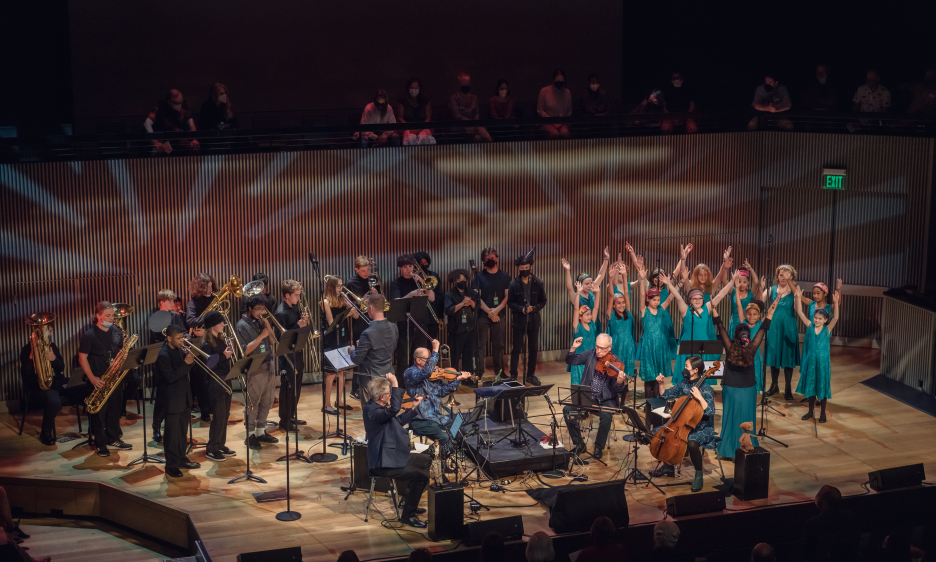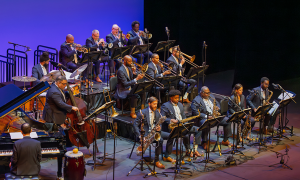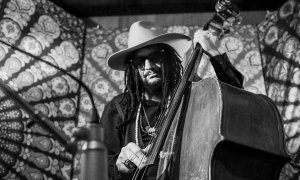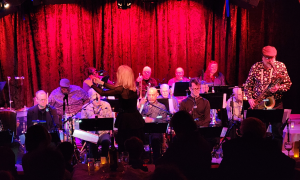Home » Jazz Articles » Live Review » Kronos Festival at SFJAZZ Center
Kronos Festival at SFJAZZ Center

Courtesy Lenny Gonzalez
SFJAZZ Center
Kronos Festival 2022
San Francisco, CA
April 7-9, 2022
Founded in 1973, Kronos Quartet has long been one of San Francisco's musical treasures. Yet, because the quartet tours internationally, a performance in its home city is an event to take note of. The three-day Kronos Festival has been a local tradition since 2014. Over 900 compositions have been composed for the group, which is famous for its collaborations with musicians ranging from Laurie Anderson and Hamza El Din to Astor Piazzolla.
Awarding the Polar Music Prize to the group in 2011, the jury noted: "For almost 40 years, the Kronos Quartet has been revolutionizing the potential of the string quartet genre when it comes to both style and content." The quartet has retained its original three members—David Harrington on lead violin, John Sherba on second violin and Hank Dutt on viola—while cellist Sunny Jungin Yang, a South Korean raised in Pretoria, joined in 2013.
For the 2022 Kronos Festival, the ensemble featured the work of longtime collaborating composer Jacob Garchik, a multi-instrumentalist and San Francisco native who now resides in New York. He first encountered Harrington when he was 12; Harrington told him he heard that he was writing music and asked if he had written any string quartets, which Garchik found to be a curious question to ask a child. Taking the stage for the first night of the festival, the group launched into the world premiere of Malian songstress Hawa Kassé Mady Diabaté's "Tegere Tulon: Janety" It featured Garchik's trombone, accompanied by a large ensemble from a local high school which provided brass and euphonium backing, as well as an all-female choir, as Garchik conducted. Young women, members of the Kairos Youth Choir, added handclapping to the mix, throwing up their arms to mark the tune's conclusion.
Next came the world premiere of Uzbekistan-born Tatar composer Adeliia Faizullina's meditative "Gubadia," a piece named after a variety of Tatar pie. It incorporated Jew's harps, played by both the first and second violinist, as part of the beginning and conclusion. The composer came onstage and took a bow.
Jimi Hendrix's version inspired a spirited and imaginative Garchik arrangement of Bob Dylan's "All Along the Watchtower." Then Michael Gordon's "Potassium," which employed a fuzz box on the strings, turned into a frenzied mix of electronic and acoustic tonalities.
The last piece before the intermission was Garchik's "Upon A Star," a zany piece which, according to Garchik, "contains elements of Jaws, Close Encounters of the Third Kind, Raiders of the Lost Ark, E.T. the Extra-Terrestrial, Jurassic Park, Schindler's List, Saving Private Ryan, The Terminal, Minority Report, Catch Me If You Can, and War of the Worlds." It was composed for a 2011 benefit which featured Stephen Spielberg as a guest of honor. The surprise of the tuba-punctuated piece was the incorporation of a puppet, a plastic male doll as well as various hand-held plastic dinosaurs (all of which contributed sound); these added spice to the piece and elicited laughter from the crowd.
After intermission, the stage seemed a bit emptier with just four performers and their instruments. It was time to perform two compositions by long-time collaborator, minimalist composer Terry Riley. First up was "The Wheel," which incorporated the words of the late Boston University Political Science professor, activist and historian Howard Zinn. Taken from a question and answer session from one of David Barsamian's Alternative Radio's interviews with Zinn in 2002, the professor expounded on organizing techniques.
This was followed by the epic 13-movement work, "Cadenza on the Night Plain," a long piece which might be likened to a minimalist raga. Riley, currently residing in Japan, sent cartoonish images representing each of the parts to Kronos, which were projected above the group as they played. Each member had his or her own solo cadenza to play, and the projected illustrated titles ranged from "Where Was Wisdom When We Went West?" to "The Night Cry of Black Buffalo Woman" to the penultimate "Captain Jack Has the Last Word." This thoughtful piece brought the evening to a close.
The second night opened with Garchik's arrangement of Indonesian composer Peni Candra Rini's "Maduswara." The daughter of a dalang, an East Javanese shadow puppet presenter, Rini's composition reflects her gamelan training and heritage. A quiet yet spirited tune, it incorporated electronic looping, a single shout and two gongs. Players picking strings of the violins and viola commenced Azerbaijan-born Franghiz Ali-Zadeh's "Oasis," a tune which melds the music of her homeland with the European classical traditions in which she has been superbly versed. The tune went on to incorporate bowing before turning pensive, with fingering by the second violinist, and then turned lively before coming to an abrupt end.
For fans of African pop music, singer and activist Angelique Kidjo is a household name. Garchik arranged Kidjo's Kronos-commissioned "YanYanKliYan Senamido #2" for the quartet. The spirited rendition featured some lovely violin playing as well as cello slapping and picking.
Lead violinist Harrington then commented that until recently he had believed that Woodstock was the most important music festival of the 1960s, but he had recently learned (likely via the 2021 documentarySummer of Soul:...Or, When The Revolution Coul Not Be Televised that the Harlem Cultural Festival was of greater importance. A new suite celebrated that festival, which took place over a number of years, with three compositions arranged by Garchik. First up was Nina Simone's "For All We Know," a composition which shows the influences of her Juilliard education in classical piano. Mahalia Jackson's 1950 classic "Take My Hand, Precious Lord" was said to be one of Martin Luther King, Jr.'s favorites and she performed it at his April 1968 funeral. The short but bittersweet version was followed by a rousing and danceable version of Sly and the Family Stone's "Everyday People," again arranged by Garchik, which prompted spontaneous rhythmic clapping from the crowd.
Following the intermission, it was time for Garchik's version of Antonio Haskell's "God Shall Wipe All Tears Away," a piece inspired by Mahalia Jackson's classic version. Second violinist Dutt's playing substituted for her vocals.
Then it was time for Garchik's arrangement of Laurie Anderson's 2010 tune "Flow," an energetic piece with a meditative, low-key beginning. At its conclusion, Garchik stood for a bow. Next was the late composer George Crumb's "God-music" from his "Black Angels," a suite inspired by the Vietnam War. A black cloth on a very long table was uncovered to reveal a battery of wine glasses of different sizes and shapes, which Harrington, Sherba and Dutt played as Yang worked her cello's bow. She suspended her bow to end the piece.
Vocalist Rinde Eckert then took the stage for the world premiere of composer Jonathan Goldberger and librettist Harriet Scott Chessman's "My Lai Suite," which had been adapted for Kronos from the forthcoming "My Lai: An opera for tenor, string quartet, and Vietnamese instruments." The opera tells the tale of helicopter pilot Hugh Thompson who intervened to save lives when US military murdered My Lai villagers in 1968. Võ had brought her monochord (đàn bầu), an instrument traditionally played by blind musicians; a bamboo xylophone (đàn t'rung), an instrument favored by the Central Highland's Jarai and Bahnar peoples, and a traditional drum (trống) to the stage with her. Eckert's deep, stern voice echoed throughout the hall as he sang while Võ moved from the intricate lattice of her enormous xylophone to her zither and then to the drums and back again. "I take him in my arms.I fly him out of hell . . . ah!" It all ended with a bow and standing ovation.
As the recipient of the 2018 Downbeat Jazz Critic's Poll's "Rising Star—Trombone," Garchik is no slouch on the instrument, only one of a few (tuba, accordion, saxophone) that he plays. Saturday afternoon saw a performance of Garchik's nine-part suite from The Heavens: the Atheist Gospel Trombone Album (Yestrereve Records, 2012)—one of five recordings he has released as a leader—at the Joe Henderson Lab. This particular recording stands apart in that Garchik played all the instruments. In the work's liner notes he maintains that "I was inspired to create this work out of a deep love for gospel music."
For this performance he was joined by a crew of local musicians (tuba, trombones, drums) for tunes ranging from "Digression on the History of Jews and Black Music" to "The Heavens." This stellar, boisterous performance supplemented with "Don't Let Him Ride," which featured an extended trombone solo by Garchik, followed by the final tune "Inevitable."
The festival's last performance, on Saturday evening, brought four additional guest artists to the stage. First up was Soo Yeon Lyu for the world premiere of the 20-minute multimedia piece "Tattoo," which covered an incident in Berkeley, CA where someone fired on Lyu's vehicle when she was with her son and mother. Lyu is master of the haegeum, a two-stringed Korean bowed instrument which she claims she will never totally master within the limits of one lifetime. Grainy images combined with red lettering on the screen throughout the piece. The composition featured a solo by Lyu and presented only two parts of three. Next up was the world premiere of composer inti figgis-vizueta's "music by yourself," which brought forth a cauldron of subtle sounds.
This was followed by the world premiere of Brian Foo and Anouk Yeh's "American Longing." As Yeh read her poetry, Wu Man held forth on the pipa, and while poet Yeh, took to the stage to relate a chilling tale: "in the first version of the story, the year is 1834, 14 year old Afong Moy is purchased from Guangzhou and shipped to New York City where she is put on exhibition at the Peale's Museum." All of this was supplemented with archival audio of Chinese music, as well as video of San Francisco's Chinatown in 1912. Then it was the time for Sofia Gubaidulina's innovative "String Quartet No. 4" which featured plucked violin and a drum mallet being employed on the cello. After the intermission, soulful Persian songstress Mahsa Vahdat took the stage for "Where Is Your Voice?," a song about the prohibition on women singing in public under Iran's repressive government.
"Where is your voice? In the throat of the Moon? In the red breaths of the thirsty lips of a lover? In a free song?"
"Vaya, Vaya," a composition inspired by Vahdat's experiences in the sanctuary she has found in Berkeley's Rose Garden "where my breath is interwoven with its soil, the moment when darkness and light embrace each other and when the intense red, dark blue, and golden rays in the clouds create a unique image, while passion, rebellion, glow, hope, and sorrow entwine."
"I'll have wings in your air I'll be a wave in your voice I'll be a flame in your flickering heat, in my cries of wanting you Bitterly I'll twist in the veins of your vines I'll be a stubborn cloud in the tears of my grief for you Vaya, Vaya"
Next up was Garchik's "Storyteller" a 16-minute piece featuring archival recordings of the famed singer, songwriter and banjo player Pete Seeger discoursing, strumming and talking. "Storyteller" was one of the works in Long Time Passing: Kronos Quartet and Friends Celebrate Pete Seeger (Smithsonian Folkways, 2020), a tribute to the late folk musician and activist. The festival's final piece was Philip Glass's "Orion: China," which was inspired by a contemplation on multicultural interpretations of our planet's relationship with the constellations. As Glass described it "no single experience of the world speaks to us so directly as when we contemplate the infinity of space, its vastness and countless heavenly bodies. In this way the stars unite us, regardless of country, ethnicity and even time." Wu Man —a collaborator on the original, evening length program—performed prolifically and exuberantly on the pipa. A satiated audience filed out.
Tags
Live Review
Kronos Quartet
Harry S. Pariser
United States
California
san francisco
David Harrington
John Sherba
Hank Dutt
Sunny Jungin Yang
Jacob Garchik
Hawa Kassé Mady Diabaté
Adeliia Faizullina
Jimi Hendrix
Bob Dylan's
Michael Gordon
Peni Candra Rini
Ali-Zadeh's
Angelique Kidjo
Nina Simone
Mahalia Jackson
Sly Stone
Antonio Haskell
Laurie Anderson
George Crumb
Rinde Eckert and Vietnamese musician {{Vân-Ânh Võ
Jonathan Berger
Harriet Scott Chessman
Soo Yeon Lyu
inti figgis-vizueta
Brian Foo
Anouk Yeh
Sofia Gubaidulina
Mahsa Vahdat
Pete Seeger
About Kronos Quartet
Instrument: Band / ensemble / orchestra
PREVIOUS / NEXT
Support All About Jazz
 All About Jazz has been a pillar of jazz since 1995, championing it as an art form and, more importantly, supporting the musicians who make it. Our enduring commitment has made "AAJ" one of the most culturally important websites of its kind, read by hundreds of thousands of fans, musicians and industry figures every month.
All About Jazz has been a pillar of jazz since 1995, championing it as an art form and, more importantly, supporting the musicians who make it. Our enduring commitment has made "AAJ" one of the most culturally important websites of its kind, read by hundreds of thousands of fans, musicians and industry figures every month.



























